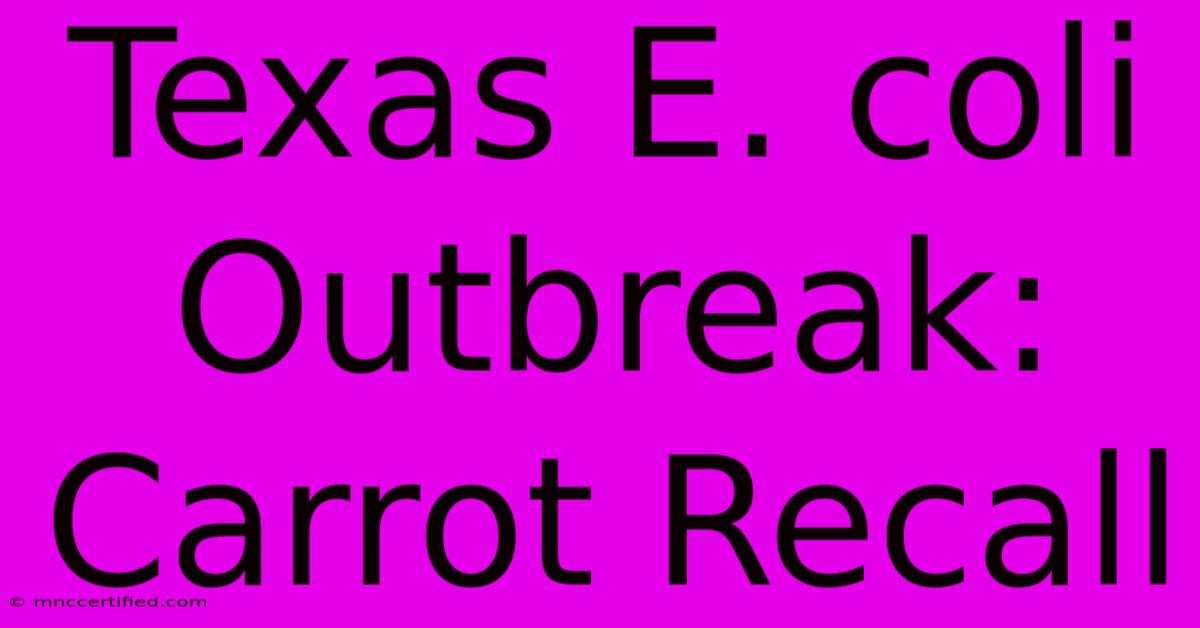Texas E. Coli Outbreak: Carrot Recall

Table of Contents
Texas E. coli Outbreak Linked to Carrots: A Comprehensive Recall Guide
A recent E. coli outbreak in Texas has been linked to contaminated carrots, prompting a widespread recall and raising concerns about food safety. This article provides crucial information about the outbreak, the recalled products, and steps to take to protect yourself and your family. We'll also delve into the investigation and the broader implications of this concerning event.
Understanding the E. coli Outbreak in Texas
The Texas Department of State Health Services (DSHS) confirmed an E. coli outbreak in [Insert Date - Update with the most recent date] affecting multiple individuals across the state. Investigations pinpointed a common source: contaminated carrots. The strain of E. coli involved is [Insert E. coli Strain - update with the specific strain]. This is a serious matter, as some E. coli strains can cause severe illness, even death.
Symptoms of E. coli Infection
It's crucial to be aware of the symptoms associated with E. coli infection. These can include:
- Diarrhea (often bloody): This is a key indicator and can be severe.
- Stomach cramps: Intense abdominal pain is common.
- Vomiting: While not always present, vomiting can accompany the other symptoms.
- Fever: A fever may or may not be present.
If you experience any of these symptoms after consuming carrots, seek immediate medical attention. Early diagnosis and treatment are essential to preventing complications.
The Carrot Recall: What You Need to Know
Several brands of carrots have been implicated in the outbreak and are subject to a nationwide recall. Check your refrigerator and pantry immediately. The recalled products will likely include:
- [Insert Brand Names and Product Descriptions Here - Update with the specific brands and product details as they become available from official sources. Be as specific as possible: include sizes, packaging details (e.g., bag, box), and any specific product codes or lot numbers].
How to Identify Recalled Carrots
Look closely at the packaging for the brand name, product description, and lot numbers listed in official recall announcements. Do not consume any carrots that match the descriptions of recalled products.
Preventing E. coli Contamination
Food safety is paramount. Here's how to minimize your risk of E. coli contamination:
- Wash your produce thoroughly: Always wash fruits and vegetables, including carrots, under running water before consumption. Scrub the surfaces gently with a brush.
- Cook your food properly: Ensure that your food is cooked to a safe internal temperature to kill any harmful bacteria.
- Practice good hygiene: Wash your hands thoroughly with soap and water before and after handling food.
- Keep raw and cooked foods separate: Avoid cross-contamination by using separate cutting boards and utensils.
- Refrigerate perishable foods promptly: Store leftovers and perishable items at the correct temperature to prevent bacterial growth.
The Ongoing Investigation and Future Implications
The investigation into the Texas E. coli outbreak is ongoing. Health officials are working to identify the source of contamination and prevent further illnesses. This outbreak underscores the importance of rigorous food safety standards throughout the supply chain, from farm to table. Future implications might include stricter regulations and enhanced monitoring practices to ensure the safety of our food supply.
Where to Find More Information
For the most up-to-date information on the recall, visit the websites of:
- The Texas Department of State Health Services (DSHS): [Insert Link Here - Update with the relevant link to the DSHS website]
- The Food and Drug Administration (FDA): [Insert Link Here - Update with the relevant link to the FDA website]
- [Insert Other Relevant Agencies' Websites - Update with links to other relevant agencies involved in the investigation and recall].
This information is for educational purposes only and should not be considered medical advice. Always consult with a healthcare professional for any health concerns. Stay informed about updates related to this recall to ensure your safety and the safety of your loved ones.

Thank you for visiting our website wich cover about Texas E. Coli Outbreak: Carrot Recall. We hope the information provided has been useful to you. Feel free to contact us if you have any questions or need further assistance. See you next time and dont miss to bookmark.
Featured Posts
-
Jennifer Lawrence In Skintight Dress
Nov 19, 2024
-
Knox Leon At A Red Carpet Event
Nov 19, 2024
-
Business Liability Insurance Utah
Nov 19, 2024
-
Life Insurance Social Media Posts
Nov 19, 2024
-
Chancellor Reeves Leeds Parish Life
Nov 19, 2024